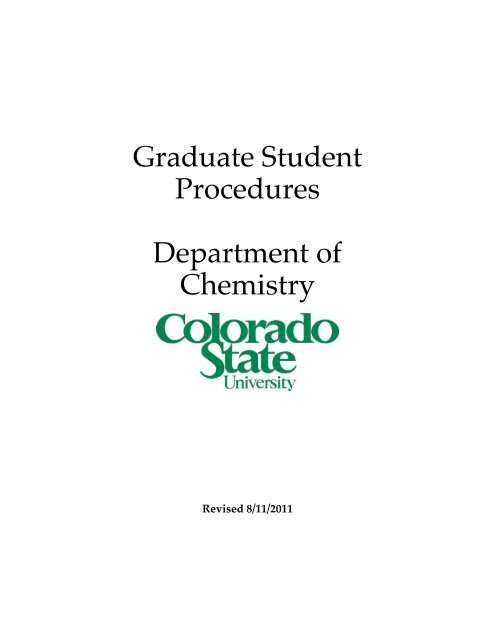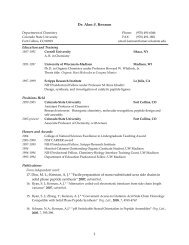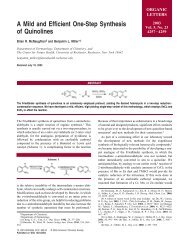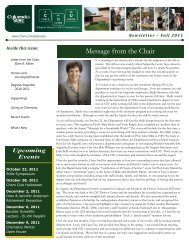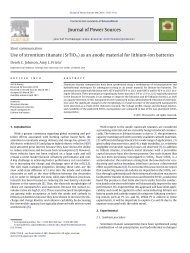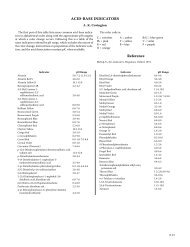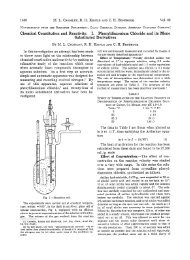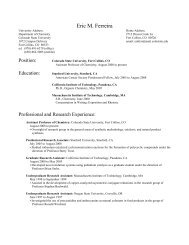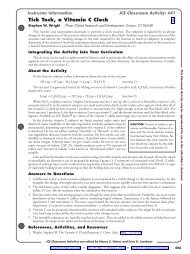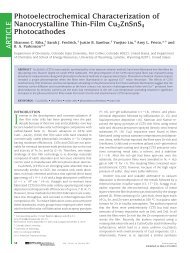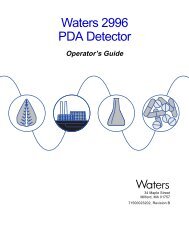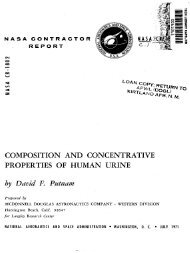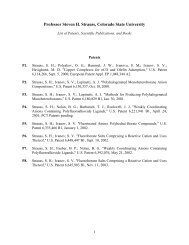The Green Book - Department of Chemistry - Colorado State University
The Green Book - Department of Chemistry - Colorado State University
The Green Book - Department of Chemistry - Colorado State University
- No tags were found...
You also want an ePaper? Increase the reach of your titles
YUMPU automatically turns print PDFs into web optimized ePapers that Google loves.
III. Graduate Course Requirements ..................................................................................................................... 19IV. Index <strong>of</strong> Required Graduate School Forms .................................................................................................. 21V. Official Policies Regarding Cumulative Exams ........................................................................................... 22VI. Family Medical Leave Policy for CSU <strong>Chemistry</strong> <strong>Department</strong> Graduate Students .............................. 23
I. Degree Requirements for Ph.D. Students in <strong>Chemistry</strong>A. Undergraduate Pr<strong>of</strong>iciency Requirements<strong>The</strong> Graduate Operations Subcommittee (GOC) strives to ensure that each chemistry graduatestudent has the tools to succeed in graduate chemistry classes. During orientation week, studentsmeet with the GOC to discuss any weak spots in prior chemistry academic experiences. Here, thecommittee considers both past performance and experience in assessing students’ readiness for anygiven graduate chemistry class. As a guideline, the GOC looks for grades <strong>of</strong> B– or better, andexposure to a full year <strong>of</strong> undergraduate Analytical, Organic, and Physical courses. For Inorganic theGOC expects to see an acceptable grade in an advanced course with a Physical chemistry prerequisite.Students who want to take a graduate course in an area for which they are considered less prepared, asituation most commonly encountered for out-<strong>of</strong>-area courses (section I.B.1), are required to either (a)obtain instructor permission through a GOC-mediated approval process, or (b) complete theappropriate undergraduate course with a grade <strong>of</strong> B– or better.In sum, undergraduate chemistry performance will be used by the GOC to advise incominggraduate students, but any prerequisites to enroll in graduate courses are enforceable by instructors.<strong>The</strong> GOC will make this information known to the graduate instructors at the beginning <strong>of</strong> eachacademic term.Admission, orientation and graduate prerequisite procedures:<strong>The</strong> Graduate Admissions Subcommittee recognizes that the faculty desires an incomingstudent class that is broadly prepared, as much as possible, to take graduate chemistry coursework inthe Analytical, Inorganic, Organic and Physical areas. Demonstrated undergraduate pr<strong>of</strong>iciency inthose areas will form part <strong>of</strong> the admissions criteria.At orientation, the GOC will review all incoming student transcripts to make sure thatstudents are prepared for graduate chemistry coursework. To enroll in graduate chemistry courses inparticular areas, students must earn grades <strong>of</strong> B– or better for the following undergraduate courses:Analytical: one semester <strong>of</strong> quantitative analysis and one semester <strong>of</strong> instrumental analysisInorganic: one semester <strong>of</strong> an inorganic course that has a physical chemistry prerequisiteOrganic: two semesters <strong>of</strong> organic coursesPhysical: two semesters <strong>of</strong> physical courses, covering quantum chemistry, thermodynamicsand kinetics<strong>The</strong> GOC will use this information to advise students on their preparation for taking graduatechemistry courses. <strong>The</strong> GOC will also distribute this information directly to graduate instructors,separating performance from exposure in the listing <strong>of</strong> transcript “flags,” and noting any extenuatingcircumstances (e.g. poor grades in an introductory course, but good grades in a related graduate<strong>of</strong>fering).If students have no flags in a particular area, they may take a chemistry graduate course inthat area. If students have a flag in an area, the instructor may enforce any and all prerequisites. <strong>The</strong>instructor may also choose to waive the prerequisite(s). Such waivers will be noted in the student’sfile.At the beginning <strong>of</strong> each semester, the GOC coordinator will distribute a list <strong>of</strong> currenttranscript flags to all graduate instructors. Instructor waivers will be processed by the GOC. If astudent would like to enroll in a class in an area in which they have a flag, they will ask the GOC t<strong>of</strong>ormally request a waiver on behalf <strong>of</strong> the student. Instructors may decide whether to allow thewaiver based on their knowledge <strong>of</strong> the course and the particular circumstances for the student (e.g.by viewing the student’s graduate application materials). Instructors will make the ultimate decisionsregarding which students they admit to their classrooms.1
B. Course RequirementsAll Ph.D. students are required to take:1. A minimum <strong>of</strong> 5 credits outside their major area <strong>of</strong> interest in two different areas (exceptby petition to the GOC). <strong>The</strong> list <strong>of</strong> acceptable courses can be found in Appendix III. Jointstudents must take 3 credits outside both major areas.2. CHEM 751 (Methods <strong>of</strong> <strong>Chemistry</strong> Laboratory Instruction) during the first and/or secondsemesters as GTAs (see section C)3. <strong>The</strong> appropriate section <strong>of</strong> CHEM 793 (Seminar) during the first year as well as anysemester in which the student presents a seminar.4. CHEM 702 (Independent Research Proposal) during their 8 th semester in residence (seeSection I).5. CHEM 601 (Responsible Conduct in <strong>Chemistry</strong> Research). No sooner than the secondsemester <strong>of</strong> the first year, but no later than the end <strong>of</strong> the second year. Students maysubstitute another <strong>University</strong> approved RCR course for CHEM601 by petition to theGOC. Alternative courses include GRAD544, PHIL666, and BC601.6. Any major-specific requirements (see Appendix III).7. Additional coursework, if any, specified by the thesis committee after the preliminary oralexam.All required courses must be included on the graduate school’s GS6 form. All courserequirements must be fulfilled by the time <strong>of</strong> graduation. Students may not take graduatecourses in any area without having demonstrated pr<strong>of</strong>iciency in it (Section A, page 1), unless itis the major research area.Students who have taken graduate courses at another institution that are comparable tocourses taught at CSU, and received a grade <strong>of</strong> B or better, may submit a course waiver formto the GOC, requesting credit for the course(s) involved. Such requests should be submittedbefore registering for first-year coursework, as they may affect GOC recommendations forsubsequent classes. If CSU does not teach a course covering the same material, no credit can begiven.Students may also request to substitute an out-<strong>of</strong>-department course (e.g. physics,biochemistry, etc.) for one <strong>of</strong> their out-<strong>of</strong>-area courses. GOC approval will be granted on acase-by-case basis. All such requests must be accompanied by written approval <strong>of</strong> the researchadvisor(s) [i.e. signature on the request].Students who wish to be affiliated with more than one area <strong>of</strong> study must meet with theiradvisor(s) to determine an appropriate curriculum. This curriculum must then be approvedby the GOC prior to submitting the GS6 form to the Graduate School.All graduate students at <strong>Colorado</strong> <strong>State</strong> <strong>University</strong> are required to be continuously registeredfrom the time <strong>of</strong> first enrollment through the graduation term.C. Teaching RequirementAt least one semester <strong>of</strong> supervised college teaching is a requirement for the Ph.D. degree inchemistry. To facilitate effective teaching, the department <strong>of</strong>fers two courses designed toprepare students for GTA work: CHEM 751 (Methods <strong>of</strong> <strong>Chemistry</strong> Laboratory Instruction,fall) and CHEM 752 (Advanced Methods <strong>of</strong> <strong>Chemistry</strong> Instruction, spring). First- and secondtimeGTAs must register for the appropriate course depending on the semester (they may betaken in either sequence). All students employed as GTAs (even those with more than two2
semesters <strong>of</strong> experience) must register for CHEM 784 (Supervised College Teaching) duringeach and every semester in which they serve as GTAs. Failure to register will result in loss <strong>of</strong> theGTA position.Students who demonstrate extensive prior teaching experience may have this requirementwaived by petition to the GOC.D. Cumulative ExaminationsCumulative examinations are administered on the first Saturday <strong>of</strong> every month fromSeptember through June (except for January). <strong>The</strong>se examinations consist <strong>of</strong> graduate-levelquestions in analytical, materials, organic, and physical chemistry. <strong>The</strong> questions are designedto emphasize the application <strong>of</strong> fundamental principles and knowledge <strong>of</strong> the currentliterature to research problems. See Appendix V for specific policies regarding theadministration <strong>of</strong> the cumulative exams.All students (except inorganic students, see below) must begin taking cumes at the start <strong>of</strong>their second semester in residence (February for fall students, September for spring students),and continue to take them every month they are <strong>of</strong>fered. Students are strongly encouraged tobegin taking cumes earlier (i.e. in the first semester), to get a feel for the process.Ph.D. students wishing to continue in the program must:• Pass 5 exams in no more than 12 <strong>of</strong>ficial attempts (e.g. up to and including April <strong>of</strong> thesecond year for fall students).• Pass 3 <strong>of</strong> the 5 cumes in the designated major area <strong>of</strong> studyAdditional notes:1. All cumulative exams are given simultaneously, during a three hour time block. Astudent may take more than one exam per session, but each counts as a separateattempt.2. Students with two major areas must pass 3 cumes in one area and 2 in the other (i.e. all5 must be in the two joint major areas).3. Students may turn in up to two first-semester exams (so-called “free tries”) withoutusing one <strong>of</strong> the <strong>of</strong>ficial 12 attempts. If more than two exams are turned in during thefirst semester, the third exam counts as the first <strong>of</strong>ficial attempt. Thus, a fall studentwho turned in the September, October, and November cumes would have untilFebruary <strong>of</strong> the second year to complete the required 5 exams.4. Missed exams (after the first semester) are counted as automatic fails unless excused bythe GOC in advance. Excused absences require a letter addressed to the GOC anddocumentation <strong>of</strong> the reason for the absence.5. A Ph.D. student who does not pass 5 cumes with the allotted time may switch to theM.S. program.6. Students in the chemical education program will be required to pass 3 cumes in theirdesignated major area <strong>of</strong> study, and will also be required to pass a written examinationon chemical education.7. Cume format for materials students: Each exam in the Materials area will be based ona specific article in the materials chemistry literature. Each month, the journal articlewill be posted as the “topic” for the materials cume. <strong>The</strong> exam will cover the content <strong>of</strong>the posted article, the underlying fundamental chemistry, and the literature cited in thearticle. Questions on each exam will be generated by multiple members <strong>of</strong> thematerials group, approaching the topic from a variety <strong>of</strong> perspectives to emphasize the3
interdisciplinary nature <strong>of</strong> materials chemistry. Exams will be graded on a pass/failbasis as determined by the faculty who contributed to the questions on the exam. Onematerials faculty mentor will serve as the coordinator for the exam, and will beresponsible for final grade decisions; all questions should be directed to this person.Written examination policy for inorganic students: students in the inorganic area will not berequired to take monthly cumulative examinations. Instead, they will (1) complete a researchpaper due at the end <strong>of</strong> their first summer in residence, and (2) will participate in a modifiedinorganic seminar program:1. Inorganic written examination format. A research paper will be submitted by theinorganic student to the inorganic GOC representative on (or before) the first Tuesdayafter Labor Day <strong>of</strong> the second year (for incoming fall 2011 students, this will be9/11/12). <strong>The</strong> paper will focus on literature background for the student’s researchproject, the student’s experimental results, and a discussion <strong>of</strong> the short term futuredirection <strong>of</strong> the project. <strong>The</strong> report will be read by two members <strong>of</strong> the InorganicDivision (the advisor will not be a reader) and returned to the student for revisions asmany times as necessary. <strong>The</strong> final paper must be approved before the end <strong>of</strong> the thirdsemester in residence, or a failing grade will be awarded. It is expected that all paperswill have to be revised at least once, but it would be possible for a particularly terribleentry to be failed on the first reading, and for an outstanding paper to be passedwithout revision.2. Inorganic seminar discussions and reports. All inorganic students will register forinorganic seminar during the first four semesters in residence, and for any semester inwhich they will give a presentation. Starting in the spring, students must turn in atleast one satisfactory seminar report per semester until four are passed. Thisrequirement must be completed before the end <strong>of</strong> the 4 th semester in residence.Students may pass more than one report per semester. <strong>The</strong> seminar report will include:• A pre-seminar overview that summarizes papers relevant to an outside speaker’stopic (due one week before that particular seminar).• A pre-seminar discussion, led by the students writing reports and attended by thehost as well as other graduate students and faculty. <strong>The</strong>se discussions will coverpapers suggested by the seminar speaker.• A post-seminar report that outlines the presentation and places the work in a moregeneral context. <strong>The</strong> report must be submitted to the host within one week <strong>of</strong> theseminar.Students who do not fulfill this requirement will get an incomplete grade for thesemester, which can revert to an F according to <strong>University</strong> policy. Up to two <strong>of</strong> thesereports may be substituted by passing an equivalent number <strong>of</strong> cumes <strong>of</strong>fered by otherdivisions/programs.Under this system, an inorganic student’s 2nd year preliminary oral examination will bescheduled for 2-6 months after satisfactory completion <strong>of</strong> all <strong>of</strong> the research and seminarreports, with the exception that no oral exam will be scheduled before the student’s fourthsemester in residence (February 2013 for fall 2011 first year students).For a student considering a dual area affiliation (e.g. inorganic/materials), note that successfulcompletion <strong>of</strong> the research and two seminar reports will count as three <strong>of</strong> the student’s fivecumes. In keeping with current policy, two cumes must be passed in the other area.Non-inorganic students are not affected by this policy.4
E. Research Advisor<strong>The</strong> GOC serves as temporary academic advisor for all incoming students. Selection <strong>of</strong> apermanent research advisor is a significant decision, and students are encouraged to gather asmuch information as possible to inform their choice. <strong>The</strong> formal procedure for choosing aresearch advisor/group is outlined below:1. All students must attend all faculty research seminars, presented in the first threeweeks <strong>of</strong> the fall semester. (Students entering in the spring are exempted from this.)2. Each student must meet one-on-one with at least five faculty members to discussresearch opportunities.3. Each student must complete at least three research group rotations before making afinal selection <strong>of</strong> his/her research advisor. Research at CSU in the summer prior tomatriculation may be counted as one group rotation.4. Students may select a research advisor no earlier than the Monday after the final examperiod following their first semester in residence. Fall students must select an adviserno later than January 31, and spring students must do so by May 15th.To remain in good academic standing, students must have a research advisor. If a facultymember is unwilling to continue as a student’s research advisor, the GOC will resume the role<strong>of</strong> academic advisor (in keeping with graduate school policy), but is not obligated to take overthe role <strong>of</strong> research advisor. <strong>The</strong> student is responsible for selecting a new research advisor,by mutual agreement with that faculty member. Failure to do so will result in dismissal fromthe graduate program.F. Degree Committee<strong>The</strong> Ph.D. degree committee, chaired by the research advisor, consists <strong>of</strong> five faculty membersand forms the primary faculty contact group for each student. Besides the research advisor,the committee consists <strong>of</strong> three chemistry faculty members and one non-chemistry facultymember (i.e. from another department). <strong>The</strong> GOC will assign committees with respect to arearather than division. Each committee will contain, in addition to the advisor, at least one inareamember and at least one out-<strong>of</strong>-area member. <strong>The</strong> remainder <strong>of</strong> the committee will beassembled by the GOC to ensure both depth and breadth on committees as well as equality infaculty committee assignments. This may or may not result in the presence <strong>of</strong> two in-divisionmembers (besides the advisor), because the focus is on appropriateness <strong>of</strong> area.<strong>The</strong> out-<strong>of</strong>-department member is selected by the research advisor and student, and must beapproved by the Dean <strong>of</strong> the Graduate School. Note that any faculty members with jointappointments in <strong>Chemistry</strong> (even zero time ones) are not eligible to serve as out-<strong>of</strong>departmentmembers.For the preliminary oral exam, committee chair duties temporarily shift to an in-area facultymember, rather than the research advisor. <strong>The</strong> oral exam chairperson is specified at the time <strong>of</strong>committee assignment. Each exam committee must have four non-advisor members. Forstudents with multiple research advisors, in-area exam-only members will be added to ensurethis minimum number.All first year students will provide the GOC with a committee nomination form by March 1.<strong>The</strong> form should list, in order <strong>of</strong> preference, five in-area chemistry faculty members and three5
out-<strong>of</strong>-area members (also in <strong>Chemistry</strong>). <strong>The</strong> research advisor(s) should not be listed.Classification <strong>of</strong> in- and out-<strong>of</strong>-area faculty should be done in consultation with the chosenfaculty advisor(s), and be specific to each students’ thesis project. Every effort will be made tohonor student priorities, while ensuring equal distribution <strong>of</strong> faculty committee assignments.G. <strong>The</strong> Preliminary Oral Examination<strong>The</strong> preliminary examination is an oral examination taken by a student in his/her second year,conducted by the student’s Ph.D. (exam) committee. <strong>The</strong> Graduate Coordinator will scheduleeach student’s oral exam no sooner than two months and no later than six months after thestudent passes his/her last cumulative exam, except that no exam will be scheduled before thestart <strong>of</strong> the fourth semester in residence.Each student will distribute to his/her committee a written research report at least one weekbefore the oral exam. Failure to distribute the report on time to even a single committeemember may result in failing the exam. <strong>The</strong> report should be detailed and complete and willnormally contain diagrams <strong>of</strong> any apparatus designed and/or built by the student, figures,tables, spectra, etc., as well as some background discussion, planned research efforts, andrelevant references. As a guideline, the report should generally be 10-12 pages in length,exclusive <strong>of</strong> any references, figures, tables, etc.<strong>The</strong> oral exam is a closed meeting, in which only the student and committee may be present.<strong>The</strong> exam begins with a brief committee review <strong>of</strong> the student’s file and laboratory progress.This review is conducted in the student’s absence, and usually does not exceed 5 minutes. <strong>The</strong>student then presents a 30-minute research seminar, which is followed by a question andanswer period focusing on basic chemical knowledge and on the student's research. Althoughpresent during the exam, the research advisor is barred from answering questions for thestudent, or in any way providing assistance that interferes with the committee’s ability toevaluate student progress.In judging student oral exam performance, several factors will be considered. Specifically, thethesis committee will judge whether the student has1. An acceptable “fund” <strong>of</strong> chemical knowledge. Questions <strong>of</strong> a general chemical natureare fair game. This includes any topic that is covered in undergraduate courses such asgeneral chemistry, organic chemistry, basic inorganic chemistry, quantitative analysis,physical chemistry, or instrumental analysis as well as topics covered in graduatecourses taken at CSU. Note that these questions will usually be related to material inthe student’s presentation or written research report.2. An acceptable understanding <strong>of</strong> the literature in his/her research area. This includesbasic knowledge <strong>of</strong> recent publications and advances, outstanding researchers in thefield, and recent publications from the student’s own research group.3. <strong>The</strong> ability to interpret results and plan research. This is an ability to examine datacritically, to identify trends in data, to explain data analysis procedures, and to <strong>of</strong>ferpossible explanations or mechanisms for observations. In addition, the committee alsolooks for the student’s ability to extend beyond the data at hand to identify the “nextsteps” in the research project, projected outcomes for planned experiments, potentialpitfalls in planned research, and possible alternate research paths the student maytake, should a planned experiment fail.6
4. Evidence <strong>of</strong> substantial, tangible progress toward solving his/her research problem.Examples <strong>of</strong> tangible progress include (but are not limited to): published orpublishable results, building <strong>of</strong> an apparatus, progress on a multi-step synthesis,collection <strong>of</strong> data, progress on writing computer code, development <strong>of</strong> an analyticaltechnique, etc. Tangible progress is not to be interpreted solely as publishable results;level <strong>of</strong> effort, persistence, and determination are key elements to this criterion.Passing all four <strong>of</strong> these requirements is necessary to pass the oral exam. Students who haveaccomplished a great deal <strong>of</strong> research but who have a shallow depth <strong>of</strong> understanding will notpass; likewise, students who have a solid academic knowledge <strong>of</strong> chemistry but who haveaccomplished very little research will not pass.<strong>The</strong> committee will take the exam timing into account in measuring research progress (i.e.those students who take the exam earlier in their careers will not be expected to haveaccomplished as much work as those who take it later).After the oral exam, the committee will assign (by majority vote) either a passing or failing grade.• Pass: <strong>The</strong> preliminary examination has been satisfactorily completed, and the studentadvances to Ph.D. candidacy. In keeping with Graduate School policy, no “conditions” maybe attached to the award <strong>of</strong> a passing grade.• Fail: <strong>The</strong> oral exam performance was comprehensively weak, such that additional course workis not sufficient to complete the preliminary examination. With committee approval, studentswill have three to six months to retake the exam, and the committee may suggest additionalcoursework or experiences expected to improve student performance. Students may petitionthe GOC for an extension <strong>of</strong> the retake deadline, but typically this is reserved for problemsbeyond the student’s control (e.g. if the committee requires taking a course that is not <strong>of</strong>fereduntil a later semester).Once the preliminary examination has been completed (regardless <strong>of</strong> the pass/fail outcome), thestudent must complete and turn in form GS16 to the graduate school within 48 hours.H. Progress Toward the Degree<strong>The</strong> fundamental charge to a thesis committee is to monitor student progress towards the degree,providing assistance and evaluation along the way. Traditionally, the preliminary exam is thefirst time that the entire committee meets to discuss a student’s progress toward the Ph.D degree,although such meetings may be called at any time (by either students or committee members).As it is usually the first close scrutiny <strong>of</strong> student performance, the preliminary examination mayspotlight particular weaknesses that the Ph.D./exam committee feels may impede futureprogress. Often these issues are not sufficient to warrant failing the exam, but the committee maynonetheless ask that they be addressed. To ensure adequate progress, the committee has widelatitude in defining “progress,” and imposing remedies. In general, evaluation criteria followalong the four themes tested at the preliminary examination (see Section G).After the preliminary oral exam, the committee will establish a timeline for future meetings tomake sure that progress is being made. Timelines may range from months to years (e.g. the nextmeeting could take place at the student’s Ph.D. defense). At one or more such meeting(s), thecommittee may require a student to present and defend an oral presentation on his/her research(or a specific aspect there<strong>of</strong>). <strong>The</strong> committee chair is responsible for communicating this timelineto the student, in writing, following the exam. A copy <strong>of</strong> the report is placed in the student’s file.7
<strong>The</strong> committee may require that a student satisfactorily complete additional coursework. Thismust be added to a student’s plan <strong>of</strong> study, resulting in the submission <strong>of</strong> an amended GS-6 form.At any time, a student’s Ph.D. committee may determine that insufficient progress is being madetoward earning the doctorate, and dismiss the student from the Ph.D. program. However, it isvery rare that such a determination would be made without allowing the student a hearing on thespecific issue(s) involved.I. Seminar Presentation RequirementsPh.D. students are required to fulfill the seminar requirement <strong>of</strong> their major research area (seebelow). Students are required to register for divisional seminars (CHEM 793) for thesemester(s) in which they will present a seminar.Analytical -Inorganic -Organic -Physical -Materials-two seminars are required; the first one is required in the third semester inresidence and the second one is required in the fourth year in residence.two seminars are required; the first one is a literature seminar and is required inthe second year in residence, and the second one is based on the thesis researchand is required in the fourth year <strong>of</strong> residence. Passing the first seminarrequires a majority vote <strong>of</strong> the inorganic and in-area faculty present; no suchvote is taken for the research seminar.one literature seminar is required before the end <strong>of</strong> the third year in residence.two seminars are required; the first one is required by the end <strong>of</strong> the secondyear in residence and the second one is required before the end <strong>of</strong> the fourthyear in residence.two seminars are required, in whichever division is deemed appropriate by theresearch advisor, in consultation with the head <strong>of</strong> the Materials Program;students are required to present a literature seminar in the third semester inresidence and a research seminar in the 8 th semester in residence.Chem. Ed.- two seminars are required; a literature seminar in the 2 nd year in residence,preferably in the declared area <strong>of</strong> chemistry; and a research seminar in the 4 thyear in residence.Students with dual major areas must give one seminar in each area.J. Research ProposalEach Ph.D. student is required to propose an original research idea in the field <strong>of</strong> chemistry. Itshould not be a trivial extension or modification <strong>of</strong> an existing research project. Proposals maybe in the general area <strong>of</strong> a student's doctoral research, but must be sufficiently distinct to beconsidered original by the advisor and primary reader.Students who have submitted a postdoctoral fellowship application (e.g. to NIH, NSF, etc.)may fulfill the proposal requirement by submitting a copy <strong>of</strong> that application. All otherstudents should follow the format below.General Guidelines8
1. Provide sufficient background information to permit review without extensiveconsultation <strong>of</strong> the literature.2. Emphasize brevity and clarity <strong>of</strong> presentation.3. Prepare publication-quality figures and schemes.4. Take care to avoid spelling and other grammatical errors.Specific Guidelines1. Length<strong>The</strong> abstract (section a) is not to exceed 1 page single-spaced. <strong>The</strong> body <strong>of</strong> the proposal(sections b and c) should be a minimum <strong>of</strong> 5 pages and a maximum <strong>of</strong> 10 pages,including figures. <strong>The</strong>re is no restriction on the length <strong>of</strong> the literature cited (section d)section. <strong>The</strong> text must all be in 10-12 point font.2. Formata. Abstract/Specific Aims. Concisely state the broad overall nature <strong>of</strong> your proposal.<strong>State</strong> the hypotheses to be tested and the aims <strong>of</strong> the research idea.b. Background and Significance. Provide a brief sketch <strong>of</strong> the background leading toyour idea. Critically evaluate and summarize existing knowledge and specificallyidentify the problem that your proposed research will solve. <strong>State</strong> concisely theimportance <strong>of</strong> your proposal.c. Research Design and Methods. Describe the research design and the proceduresthat will be used to accomplish the specific aims. Include how the data will becollected, analyzed, and interpreted. Describe any new methodology and itsadvantage over existing methodologies. Discuss the potential limitations <strong>of</strong> theproposed procedures and alternative approaches to achieve the aims.d. Literature Cited. List all pertinent references. Each reference must include thecomplete title <strong>of</strong> the paper or article, names <strong>of</strong> all authors, book or journal, volumenumber, page numbers, and year <strong>of</strong> publication. Do not include an excessiveamount <strong>of</strong> text in your references. This section should be limited to relevant andcurrent literature.Submission and EvaluationStudents must register for CHEM 702 (Independent Research Proposal) in the spring <strong>of</strong> theeighth semester in residence, and may submit the proposal during that semester. <strong>The</strong> gradefor the course will be that awarded to the proposal, or a grade <strong>of</strong> I (incomplete) if the proposalis not submitted. It is <strong>University</strong> policy that any grade <strong>of</strong> I is converted to an F after onecalendar year, and that no student may receive a degree with an unresolved I on his/hertranscript. A 1-page preliminary outline describing the original idea must be submitted to thethesis advisor and reader for approval. By default, the GOC assigns the proposal reader fromthe student’s in-area thesis committee members. Students may petition the GOC for a change<strong>of</strong> assignment if a non-committee member with expertise in the research area is identified.Unacceptable outlines will necessitate the formation <strong>of</strong> a new proposal.<strong>The</strong> final written proposal must be submitted to the Graduate Operations Coordinator forcopying and distribution to the advisor and reader no later than two months before thestudent’s final defense.9
<strong>The</strong> reader will complete a proposal rating sheet, including a pass/fail grade, turn it in to themain <strong>of</strong>fice, and provide a copy to the student. This evaluation, along with a copy <strong>of</strong> theproposal, will become part <strong>of</strong> the student’s permanent file.If a failing grade is assigned, specific recommendations for improvement will be provided,and the student must re-submit a revised proposal. <strong>The</strong> final (revised) proposal must bepresented to the thesis committee with the dissertation, and, at the option <strong>of</strong> the student, maybe included with the final dissertation copy for the Graduate School.<strong>The</strong> GOC will be consulted in the case <strong>of</strong> disagreements on the proposal evaluations.Remedies include, but are not limited to, calling a conference including the advisor and fullthesis committee, assigning additional readers, or organizing a formal defense <strong>of</strong> the proposalby the student. <strong>The</strong> reader will adjust the rating sheet to incorporate the necessary changes.K. Final Research ConferencePh.D. candidates can opt to meet with their degree committee prior to writing theirdissertations (in some cases, as explained below, this meeting is mandatory). <strong>The</strong> conference isdesigned to ensure timely completion <strong>of</strong> the Ph.D. degree, to facilitate satisfactory completion<strong>of</strong> the thesis research, and to prepare the student for the final oral examination. At theconference, the student will summarize the research done to date, as well as the worknecessary to complete the research project.<strong>The</strong> Graduate Operations Coordinator automatically notifies students who are approachingthe end <strong>of</strong> their sixth year that a conference must be scheduled. This meeting is required for allsixth year students unless they are likely to defend before the end <strong>of</strong> the year. If all parties (student,advisor, committee, GOC) agree that completion <strong>of</strong> degree requirements is imminent and theconference is unnecessary, it will be waived. In keeping with time-to-completion goals, nostudent beyond the sixth year will be guaranteed departmental support (e.g., in the form <strong>of</strong> aGTA). Should the committee conclude at the final research conference that degree completionis not imminent, but that adequate progress is being made, it will establish and supervise afirm schedule for the completion <strong>of</strong> requirements. If the committee finds that adequateprogress is not being made, termination from the Ph.D. program will be recommended.L. <strong>The</strong> Ph.D. Dissertation<strong>The</strong> final Ph.D. dissertation should be prepared in accordance with current graduate schoolpolicies and regulations. It must be submitted to the committee in completed form no later thantwo weeks before the final oral examination. To be considered complete, the dissertation mustinclude all chapters and data which the student and advisor agree are required to fullydescribe the research project. No additional experiments or inclusions should be planned orongoing at the time <strong>of</strong> submission, unless they are not intended to be included in the finaldocument. Many modern research projects involve substantial contributions from severalcoworkers, <strong>of</strong>ten resulting in joint publication. In such cases, each dissertation must clearlydelineate work actually done by the student from that done by co-workers on the project.M. Final Oral ExaminationStudents present a public seminar on the thesis work, followed by a private examination bythe degree committee. A signed GS-24 form must be submitted to the Graduate School within10
two working days after the exam. <strong>The</strong> time and place <strong>of</strong> the exam must also be postedthroughout the department no later than one week prior to the exam.N. Check Out ProceduresPh.D. students must provide their thesis advisor, and any member <strong>of</strong> their degree committeewho requests it, a copy <strong>of</strong> their final, corrected thesis. In addition, some faculty members mayrequire additional thesis copies from their students. Students must also return to the advisorall intellectual property (i.e. data, spectra, chemicals, apparatus, disks, notebooks, and all otherdevices and equipment being utilized in the research project) associated with their research at<strong>Colorado</strong> <strong>State</strong> <strong>University</strong>.<strong>The</strong> Graduate School requires that two unbound copies <strong>of</strong> the thesis in final form must besubmitted by the deadline date for the term <strong>of</strong> graduation. Before submitting these copies thestudent must get final approval by the <strong>Department</strong> <strong>of</strong> <strong>Chemistry</strong>’s main <strong>of</strong>fice. <strong>The</strong> graduateschool will not accept final copies <strong>of</strong> a student's thesis without this departmental clearance. Ifthe student chooses, the main <strong>of</strong>fice will be responsible for submitting the thesis to thegraduate school. At this time, the student will also be required to complete an informationalexit form for the department (including the student's forwarding address, termination datesfor payroll, and other information needed for the department's annual report).Students who fail to comply with these requirements or who fail to complete the departmentalexit form, may, at the behest <strong>of</strong> their advisor or the department chair, have their transcriptsput on hold at the Office <strong>of</strong> Admissions and Records and/or will not have completed theirdegree requirements and will not receive their degrees until all degree requirements,including proper check-out procedures from the department and research group, are met.11
II. Changing Degree ProgramStudents who decide to change from a Ph.D. degree to a M.S. degree program must submit theGS-7 (Request for Change <strong>of</strong> <strong>Department</strong> and/or Degree and Program) and GS-6 (Program <strong>of</strong>Study) forms to the Graduate School. <strong>The</strong>se forms can be obtained from the GraduateOperations Coordinator or the Graduate School.III. Degree Requirements for Plan A M.S. Students in <strong>Chemistry</strong>A. Undergraduate Pr<strong>of</strong>iciency Requirements: same as Ph.D. (section A, page 1).B. Course Requirements: same as Ph.D. (section B, page 1), except that M.S. students are notrequired to complete an independent research proposal, and thus need not register for CHEM702. Students who switch into the M.S. program from the Ph.D. program must adjust their GS6forms to delete CHEM 702.C. Teaching Requirement: same as Ph.D. (section C, page 2).D. Cumulative ExaminationsM.S. candidates are required to pass a total <strong>of</strong> two out <strong>of</strong> twelve cumulative examinations,without restriction as to field. See Ph.D. requirements for all other details (section D, page 2).E. Research Advisor: same as Ph.D. (section E, page 4).F. Degree Committee: same as Ph.D.(section F, page 5), except:1. Only three members: research advisor, one in-area chemistry faculty member, one out-<strong>of</strong>departmentfaculty member.2. If the student has a Ph.D. committee when entering the M.S. program (i.e. if the studentwas previously a Ph.D. candidate), the new committee will be formed by deletion <strong>of</strong> twomembers, as selected by the advisor.G. Seminar RequirementAll M.S. students must present an acceptable seminar within their area <strong>of</strong> study; this mayinclude the public portion <strong>of</strong> the M.S. final oral examination.H. Time to Completion <strong>of</strong> DegreeIn an effort to monitor the progress <strong>of</strong> M.S. students toward their degrees, the followingguidelines have been instituted:<strong>Department</strong>al support <strong>of</strong> M.S. students (e.g. in the form <strong>of</strong> a GTA) will be guaranteed onlyuntil a “reasonable time for completion” <strong>of</strong> the degree has expired. <strong>The</strong> reasonable time will bedefined according to when students switch into the Master’s program as follows:1. For students who switch prior to completion <strong>of</strong> the oral exam (including those whoswitch essentially upon matriculation), the “reasonable time” will elapse at the end <strong>of</strong>their third year in residence.2. For those who switch after completion <strong>of</strong> their oral exam requirements, the “reasonabletime” will elapse one year after the student has switched degree programs.12
As with all GTA positions, any support is also contingent upon the student being in goodacademic standing and meeting adequate teaching standards as set by the departmental GTAcommittee. Additional support after the “reasonable time” has expired may be available, butwill not be guaranteed.If a M.S. student has not completed degree requirements prior to the end <strong>of</strong> the fourth year inresidence, a research conference must be scheduled between the student and his/her M.S.thesis committee. If all parties (student, advisor, committee, GOC) agree that completion <strong>of</strong>degree requirements is imminent and the conference is unnecessary, it will be waived.This research conference is designed to ensure timely completion <strong>of</strong> the M.S. degree, t<strong>of</strong>acilitate satisfactory completion <strong>of</strong> the thesis research, and to prepare the student for the finaloral examination. At the conference, the student will summarize the research done to date, aswell as the work necessary to complete the research project.Should the committee conclude at the final research conference that degree completion is notimminent, but that adequate progress is being made, it will establish and supervise a firmschedule for the completion <strong>of</strong> requirements. If the committee finds that adequate progress isnot being made, termination from the M.S. program will be recommended.I. <strong>The</strong> M.S. Dissertation – same as Ph.D. (section K, page 9)J. Final Oral Examination –- same as Ph.D. (section L, page 10).K. Check Out Procedures –- same as Ph.D. (section M, page 10).IV. Degree Requirements for non-thesis M.S. Students in <strong>Chemistry</strong> (Plan B)A. Placement Examinations: same as Ph.D. (section A, page 1).B. Course Requirements: same as Ph.D. (section B, page 1), except that M.S. students arenot required to complete an independent research proposal, and thus need not registerfor C702. Students who switch into the M.S. program from the Ph.D. program must adjusttheir GS6 forms to delete C702.C. Teaching Requirement: same as Ph.D. (section C, page 2).D. Cumulative ExaminationsM.S. candidates are required to pass a total <strong>of</strong> two out <strong>of</strong> twelve cumulative examinations ortheir equivalent, without restriction as to field. See Ph.D. requirements for all other details(section D, page 2).E. Research Advisor: same as Ph.D. (section E, page 4).F. Degree Committee: same as Ph.D.(section F, page 4), except:1. Only three members: research advisor, one in‐area chemistry faculty member, oneout‐<strong>of</strong> department faculty member.2. If the student has a Ph.D. committee when entering the M.S. program (i.e. if thestudent was previously a Ph.D. candidate), the new committee will be formed bydeletion <strong>of</strong> two members, as selected by the advisor.G. Presentation Requirement: All M.S. students must make a faculty refereed scientific13
presentation and pass an examination associated with that presentation. Students mayfulfill this requirement three different ways:1) Seminar: Students may present a public seminar focused on literature within their area<strong>of</strong> study, followed by a private examination by the degree committee.-OR-2) Final Oral Examination: Students may present a public seminar based on their researchproject, followed by a private examination by the degree committee.-OR-3) Ph.D. Candidacy Examination: Students may fulfill the presentation requirement byhaving passed the candidacy exam for the Ph.D. degree.In cases where a student has completed the seminar prior to opting into the Master <strong>of</strong>Science degree, the student may schedule the private examination by the degreecommittee at a time separate from and after the seminar presentation in which they makea short presentation about the seminar topic or their research project followed by a privateexamination by the committee.H. Time to Completion <strong>of</strong> Degree: Students should have attained all the requirements tosatisfy the plan B Master in Science in <strong>Chemistry</strong> degree by the end <strong>of</strong> their fourthsemester in residence. It is expected that the student will graduate from the program afterthe fourth semester or within a semester after the term in which they switch to the M.S.program, if they move from the Ph.D. to M.S. program at a later date. Students switchingfrom the Ph.D. to M.S. program should change the GS 6 form, eliminating CHEM 702.I. Check Out Procedures –‐ same as Ph.D. (section M, page 9).V. Guidelines for Terminating the Research Advisor/Graduate Student Relationship<strong>The</strong> <strong>Colorado</strong> <strong>State</strong> <strong>University</strong> Bulletin Handbook on Graduate Study (USPS 775-920) statesthat: "Pursuant to <strong>State</strong> Statute, CRS 24-19-104, all graduate assistants are ‘employees at will‘and their employment is subject to termination by either party at any time. <strong>The</strong>Provost/Academic Vice President must review and approve any recommendationsconcerning the termination <strong>of</strong> graduate assistants on any grounds, except for terminations atthe end <strong>of</strong> the stated employment period. <strong>The</strong> provisions <strong>of</strong> this section shall not beinterpreted to authorize the termination <strong>of</strong> any graduate assistant for any reason that iscontrary to applicable federal, state or local law."Most graduate students in the <strong>Department</strong> <strong>of</strong> <strong>Chemistry</strong> at CSU choose an advisor in their firstyear and remain with that advisor for their entire graduate career. <strong>The</strong> facultyadvisor/graduate student relationship may be terminated, however, because <strong>of</strong> dissatisfactionby either the student or the faculty advisor. In either case, it is important that both partiesrespect the needs <strong>of</strong> the other. <strong>The</strong> following procedure is designed to accomplish this.A. Termination by AdvisorIf a faculty member is dissatisfied with the research efforts <strong>of</strong> a student, it is his/herprerogative to terminate the relationship. <strong>The</strong> decision to terminate the advisor/studentrelationship may be precipitated by various events, including but not limited to:• disruptive behavior;• failure to make satisfactory progress toward the dissertation problem as determined bythe advisor and/or the thesis committee;14
• scientific misconduct;• unethical behavior;• poor scholarly attitude; or• poor performance in laboratory and/or course work.To terminate the advisor-student relationship, the research advisor must notify the student,the student's thesis committee, and the department chair in writing, giving reasons for thedissatisfaction in performance. <strong>The</strong> faculty advisor may elect to allow a probationary period,to allow the student to improve, or may decide upon immediate dismissal.<strong>The</strong> advisor must keep the student on the payroll for 30 days after the notification is receivedor until a new research director puts the student on his/her payroll (whichever is shorter). Ifthe student is terminated early in the semester, the student's advisor, the department chair,and the appropriate GOC member (as a mediator) will meet to work out a reasonablecompromise regarding possible further financial obligations on the part <strong>of</strong> the advisor and/orthe department. <strong>The</strong> mediator will also help define the student's status, vis-à-vis hourlyemployment, registration for classes, the graduate school, etc. A reasonable attempt will bemade to have this meeting within the 30-day time period.Since a graduate student's thesis committee is charged with determining whether the studentis making satisfactory progress toward a degree (see section I.H), the student and/or theadvisor may request a meeting <strong>of</strong> the student's thesis committee to discuss the situation.According to the CSU bulletin (USPS 775-920) on Guidelines for Graduate Advising andCommittee Service, the meaning <strong>of</strong> satisfactory progress "clearly extends beyond course workperformance and involves the making <strong>of</strong> a collective judgment on the part <strong>of</strong> the committee."Under certain circumstances, the committee may recommend immediate dismissal <strong>of</strong> astudent.It is the student's obligation to turn over all intellectual property (i.e. data, spectra, chemicals,apparatus, disks, notebooks, and all other devices and equipment being utilized in theirresearch), arranged in a manner that will allow the research director to continue the work. <strong>The</strong>student must also turn in all keys to the <strong>Chemistry</strong> Main Office. If these materials are notturned over within one week <strong>of</strong> the notification <strong>of</strong> termination date, the remaining salaryobligation <strong>of</strong> the research director is canceled and any pay from a new research director or thedepartment will be held in escrow until the above obligations are met.B. Termination by StudentTo terminate the advisor-student relationship, the student must give the faculty advisor, thethesis committee, and the department chair 30 days written notice, giving reasons for leavingthe research group. During this time the research project must be brought to a point where it iseasily passed on to a new person. All intellectual property (i.e. data, spectra, chemicals,apparatus, disks, notebooks, and all other devices and equipment being utilized in theirresearch project) and keys must be returned to the advisor's research areas before the studentcan be put on another faculty member's payroll.C. <strong>Department</strong>al Obligation<strong>The</strong> chemistry department recognizes that the student-advisor relationship is a crucial elementin the education experience <strong>of</strong> graduate students. For this reason, a chemistry graduatestudent without a research advisor at CSU is not considered to be in good academic standingin the department. <strong>The</strong> chemistry department is under no obligation to provide financial15
support, laboratory space, or any other educational materials for a student who is not in goodstanding.16
Appendix I: Ph.D. Degree Requirements DeadlinesPlacement RequirementsDemonstrate undergraduate pr<strong>of</strong>iciency in each <strong>of</strong> four areas (analytical, inorganic, organic, andphysical) by the end <strong>of</strong> the second year.Cumulative Examinations:Pass 5 exams in no more than 12 <strong>of</strong>ficial attempts (e.g. up to and including April <strong>of</strong> the secondyear for fall students)Research Advisor:Select an advisor no later than the end <strong>of</strong> January (fall students) or middle <strong>of</strong> May/end <strong>of</strong> springsemster (spring students) <strong>of</strong> the first year.Program <strong>of</strong> Study (GS6) form:Must be submitted before registration for the fourth regular semester. Typically submittedduring the first summer, once committees have been established.Preliminary Oral Examination (Ph.D. only):May/January <strong>of</strong> second year for fall/spring students. A written report must be submitted at leastone week prior to the exam date.Research Proposal (Ph.D. only):Must register for C702 (Independent Research Proposal) in the spring <strong>of</strong> their eighth semester inresidence to complete this degree requirement.Submission <strong>of</strong> <strong>The</strong>sis or Dissertation:Must be submitted to all committee members at least two weeks prior to the final oralexamination.Signed and Final <strong>The</strong>sis or Dissertation:Must be submitted to the Graduate School for binding two weeks prior to graduation.Final Clearance:A GS-25 form must be submitted to the Graduate School two weeks prior to graduation.17
Appendix II: Proposal Rating SheetStudent Name_________________________Date <strong>of</strong> Conference__________________________(if applicable)Advisor______________________________Reader(s)__________________________________________________________ Grade (check one) __ P __ FRate each <strong>of</strong> the following aspects on a scale <strong>of</strong> 1-6:(1)Truly Exceptional (2) Excellent (3) Very Good (4) Good (5) Fair (6) Poor__________OriginalityJustification / Literature PrecedentExperimental DesignWritten PresentationOverall Proposal EvaluationComments (100 words minimum):Reader signature___________________________Advisor signature__________________________18
Appendix III: Graduate Course RequirementsCourse # Course Credits Semesters OfferedAnalytical (six credit hours total)Three credit hours from the six one-credit modules <strong>of</strong> C530 Advanced Topics in Chemical Analysis:CHEM 530A Environmental Chemical Analysis 1 odd FACHEM 530B Absorption and Emission Spectroscopy 1 even FACHEM 530C Bioanalytical <strong>Chemistry</strong> 1 odd FACHEM 530D Statistical Analysis in Analytical <strong>Chemistry</strong> 1 odd FACHEM 530E Mass Spectrometry 1 even FACHEM 530F Analysis <strong>of</strong> Materials 1 even FAPlus three credit hours from:CHEM 532 Advanced Chemical Analysis II 3 odd SPCHEM 533 Chemical Separations 3 even SPCHEM 537 Electrochemical Methods 3 odd SPCHEM 577 Surface <strong>Chemistry</strong> 3 even SPInorganic (six credit hours total)Three credit hours from the four one-credit modules <strong>of</strong> C563 Physical Methods in Inorganic <strong>Chemistry</strong>:CHEM 563A Group <strong>The</strong>ory 1 SPCHEM 563B Vibrational Spectroscopy 1 SPCHEM 563C Electronic Structure and Magnetism 1 variesCHEM 563D Magnetic Spectroscopies 1 SPPlus three credit hours from:CHEM 551 Organometallics 3 odd SP*CHEM 566 Bioinorganic <strong>Chemistry</strong> 3 variesCHEM 511 Solid <strong>State</strong> <strong>Chemistry</strong> 3 odd FACHEM 565 Inorganic Mechanisms 3 variesCHEM 561 Inorganic Synthesis 3 FACHEM 569 Chemical Crystallography 3 varies*must be taught by an Inorganic faculty member to count for Inorganic creditOrganic (nine credit hours total)CHEM 543 Structure/Mechanisms in Organic <strong>Chemistry</strong> 3 FACHEM 545 Synthetic Organic <strong>Chemistry</strong> I 3 FACHEM 549 Synthetic Organic <strong>Chemistry</strong> II 3 SPPhysical (six credit hours total)CHEM 570 Chemical Bonding 3 variesCHEM 571 Quantum <strong>Chemistry</strong> 3 FACHEM 575 Chemical <strong>The</strong>rmodynamics 3 even FACHEM 576 Statistical Mechanics 3 odd SPCHEM 579 Chemical Kinetics 3 odd FACHEM 773 Atomic and Molecular Spectroscopy 3 variesMaterials (six credit hours total)CHEM 511 Solid <strong>State</strong> <strong>Chemistry</strong> 3 odd FACHEM 515 Polymer <strong>Chemistry</strong> 3 odd FACHEM 517 Chemstry <strong>of</strong> Electronic Materials 3 variesCHEM 530F Analysis <strong>of</strong> Materials 1 even FACHEM 563C Electronic Structure and Magnetism 1 variesCHEM 569 Chemical Crystallography 3 variesCHEM 577 Surface <strong>Chemistry</strong> 3 even SP19
<strong>Chemistry</strong> EducationStudents who specialize in chemistry education research (Chem. Ed.) must also declare a specific “area” inchemistry (i.e., analytical, inorganic, materials, organic, physical) in which they will study and performgraduate research in addition to their research in chemistry education. <strong>The</strong> required coursework for studentsin the <strong>Chemistry</strong> Education Program includes the following:6 credit hours from within their declared area (see above listings) + one <strong>of</strong> the following two courses:Course # Course Credits Semesters OfferedPSY 652 Methods <strong>of</strong> Research in Psychology I 4 FASTAT 511 Design and Data Analysis for Researchers 4 FA+ at least 3 credit hours from the following list <strong>of</strong> courses:Course # Course Credits Semesters OfferedPSY 600F Adv Psychology–Human Learning & Memory 3 FA & SPPSY 600M Adv Psychology–Cognitive Processes 3 FA & SPPSY 692B Cognitive Psychology Seminar (specific topics and credits vary) V (FA, SP, & SU)Out <strong>of</strong> Area RequirementsOut <strong>of</strong> area requirements may be fulfilled from the following list <strong>of</strong> courses, or other out-<strong>of</strong>-departmentcourses approved by the GOC on a case-by-case basis. Most <strong>of</strong> these courses do not have graduate levelprerequisites.Courses that satisfy analytical out-<strong>of</strong>-area: CHEM 530A–F, CHEM 532, CHEM 533, CHEM 537, CHEM 539A-C, CHEM 577Courses that satisfy inorganic out-<strong>of</strong>-area: CHEM 511, CHEM 551*, CHEM 561, CHEM 563A–F, CHEM 565Courses that satisfy organic out-<strong>of</strong>-area: CHEM 543, CHEM 545, CHEM 547, CHEM 551*Courses that satisfy physical out-<strong>of</strong>-area: CHEM 570, CHEM 571, CHEM 575, CHEM 576, CHEM 579Courses that satisfy materials out-<strong>of</strong>-area: CHEM 515, CHEM 517Courses that satisfy biological out-<strong>of</strong>-area: CHEM 547 (chemical biology), CHEM 651 (biosynthesis)Note: Since 2008, CHEM 569 has been approved by the GOC on a case-by-case basis as satisfying out-<strong>of</strong>-arearequirements when the other out-<strong>of</strong>-area course was from the inorganic area.Out-<strong>of</strong>-department courses that have been used (or suggested) recently to satisfy out-<strong>of</strong>-area requirements:BC 511Structural BiologyCBE 514Polymer Science and EngineeringMECH 531Materials EngineeringMECH/BIOM Structure and Function <strong>of</strong> Biomaterials573PH 531Introductory Solid <strong>State</strong> PhysicsPH 631Solid <strong>State</strong> PhysicsPH/ECE 672 Principles <strong>of</strong> Semiconductors*course taught by multiple divisions, assigned area depends on instructor20
Appendix IV: Index <strong>of</strong> Required Graduate School FormsForms required <strong>of</strong> all graduate students:GS6 Program <strong>of</strong> Study Before registration for the 4 th semesterGS25 Application for Graduation Check with Graduate School for deadline dates atand Diploma Name Formthe beginning <strong>of</strong> the graduation term*GS24 Report <strong>of</strong> Final Within two working days after results are known,Examination Resultsbut no later than published deadline datesForms required <strong>of</strong> all Ph.D. students:GS16 Report <strong>of</strong> Preliminary Two working days after results are knownExamination(must be taken two terms prior to final exam)Survey <strong>of</strong> Earned DoctorateUMI Doctoral DissertationAgreement FormPrior to end <strong>of</strong> 12th week <strong>of</strong> graduation term**Prior to end <strong>of</strong> 12th week <strong>of</strong> graduation term**Dissertation Release Form Prior to end <strong>of</strong> 12th week <strong>of</strong> graduation term **Additional forms required for other actions:GS1B Re-admission At least two months prior to re-entry termGS7 Request for Change <strong>of</strong> <strong>Department</strong> Prior to the term the change is to occurand/or ProgramGS9A Petition for Change in Committee As changes occur or prior to final examinationGS14 Report <strong>of</strong> <strong>Department</strong>al Examination File results <strong>of</strong> departmental examsGS25B <strong>Department</strong>al Requirements No later than last day <strong>of</strong> termGS26 Request for Certificate <strong>of</strong> Completion Upon request. Usually available after thesisdeadline date* Prior to the end <strong>of</strong> the 1st week <strong>of</strong> the eight-week summer term.** Prior to the end <strong>of</strong> the 5th week <strong>of</strong> the eight-week summer term.Graduate School forms and deadline dates are available from the Graduate School <strong>of</strong>fice or at website:http://graduateschool.colostate.edu21
Appendix V: Specific Cumulative Exam Procedures• All cumes are held in <strong>Chemistry</strong> A101, from 9:00 a.m. – 12:00 p.m.• Exams are administered on the first Saturday <strong>of</strong> each month, September-June (except January)• Topics for cumes in Analytical, Materials, and Physical will be posted two weeks before the exam onbulletin boards opposite the elevator. In general, Organic cumes do not have topics.• Cumes are written by faculty members <strong>of</strong> the appropriate division or program. Identities <strong>of</strong> cume writerscan be obtained after (but not before) the cume is administered.• Pens, pencils, a calculator, a molecular model kit, snacks, and beverages are permitted during the exam.Neither models nor calculators may be shared. All other items (including backpacks, coats, cell phones,iPods/MP3 players, etc.) must be left elsewhere or put to the side <strong>of</strong> the room. Blank paper will beprovided.• All exams are administered simultaneously. You may pick up, inspect, and keep any/all exams.• Once you enter the exam room, you may not leave before handing in your exam, except to use the firstfloor restrooms (no breaks for c<strong>of</strong>fee, cigarettes, etc.).• A proctor from the GOC will be present either in the exam room or in the lobby during the exam. If youhave questions, you should feel free to ask the proctor. No other talking is permitted during the exam.22
Appendix VI: Family Medical Leave Policy for CSU <strong>Chemistry</strong> <strong>Department</strong> Graduate StudentsUnder CSU’s Family Medical (FM) Leave Policy, any graduate student who has been employed full time for atleast twelve (12) months is eligible for unpaid leave (up to 12 weeks) for any one (1) or a combination <strong>of</strong> thefollowing reasons: (a) <strong>The</strong> birth <strong>of</strong> a son or daughter, and to care for the newborn child (leave must becompleted within twelve (12) months <strong>of</strong> the date <strong>of</strong> birth); (b) <strong>The</strong> placement <strong>of</strong> a son or daughter for adoptionor foster care with the employee and to care for the newly placed child (leave must be completed withintwelve (12) months <strong>of</strong> the date <strong>of</strong> placement); (c) To care for a spouse, son, daughter, or parent with a serioushealth condition; and (d) Because <strong>of</strong> a serious health condition which causes the employee to be unable toperform one or more <strong>of</strong> the essential functions <strong>of</strong> his or her position. (Refer tohttp://www.facultycouncil.colostate.edu/files/manual/appendic.htm, Appendix 3, for further detailsregarding the <strong>University</strong>’s Family Medical Leave Policy.)<strong>The</strong> <strong>Chemistry</strong> <strong>Department</strong> may provide for such FM leave to be paid for students who are in good standingin the graduate program in chemistry and who have not yet defended their thesis or dissertation. In keepingwith <strong>University</strong> policy regarding FM Leave, graduate students must submit requests for paid FM leave inwriting, using the “<strong>Chemistry</strong> Graduate Student Paid FM Leave Request Form” and the "Certification <strong>of</strong>Health Care Provider" forms, which follow this description. Such requests should be submitted to ShellySwanson in the Main Office <strong>of</strong> the <strong>Chemistry</strong> <strong>Department</strong> as soon as practicable, and preferably at least thirty(30) days prior to the requested start date, to allow the <strong>Department</strong> the maximum opportunity to provide forcoverage <strong>of</strong> responsibilities.Students who qualify for paid FM leave will be paid at their normal rate during the approved leave period.23


